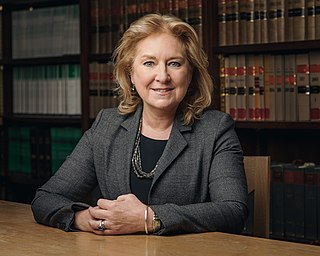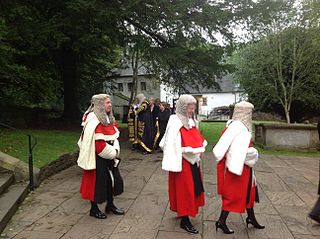
The Lord Chancellor, formally titled Lord High Chancellor of Great Britain, is the highest-ranking traditional minister among the Great Officers of State in Scotland and England in the United Kingdom, nominally outranking the prime minister. The lord chancellor is appointed by the sovereign on the advice of the prime minister. Prior to the union of England and Scotland into the Kingdom of Great Britain, there were separate lord chancellors for the Kingdom of England and the Kingdom of Scotland. There were Lord Chancellors of Ireland until 1922.

The Lord President of the Court of Session and Lord Justice General is the most senior judge in Scotland, the head of the judiciary, and the presiding judge of the College of Justice, the Court of Session, and the High Court of Justiciary. The Lord President holds the title of Lord Justice General of Scotland and the head of the High Court of Justiciary ex officio, as the two offices were combined in 1836. The Lord President has authority over any court established under Scots law, except for the Supreme Court of the United Kingdom and the Court of the Lord Lyon.

The Lady Chief Justice of England and Wales is the head of the judiciary of England and Wales and the president of the courts of England and Wales.

The High Court of Justiciary is the supreme criminal court in Scotland. The High Court is both a trial court and a court of appeal. As a trial court, the High Court sits on circuit at Parliament House or in the adjacent former Sheriff Court building in the Old Town in Edinburgh, or in dedicated buildings in Glasgow and Aberdeen. The High Court sometimes sits in various smaller towns in Scotland, where it uses the local sheriff court building. As an appeal court, the High Court sits only in Edinburgh. On one occasion the High Court of Justiciary sat outside Scotland, at Zeist in the Netherlands during the Pan Am Flight 103 bombing trial, as the Scottish Court in the Netherlands. At Zeist the High Court sat both as a trial court, and an appeal court for the initial appeal by Abdelbaset al-Megrahi.

Lords of Appeal in Ordinary, commonly known as Law Lords, were judges appointed under the Appellate Jurisdiction Act 1876 to the British House of Lords, as a committee of the House, effectively to exercise the judicial functions of the House of Lords, which included acting as the highest appellate court for most domestic matters.

Mary Howarth Arden, Baroness Mance,, PC, known professionally as Lady Arden of Heswall, is a former Justice of the Supreme Court of the United Kingdom. Before that, she was a judge of the Court of Appeal of England and Wales.

The Constitutional Reform Act 2005 is an Act of the Parliament of the United Kingdom, relevant to UK constitutional law. It provides for a Supreme Court of the United Kingdom to take over the previous appellate jurisdiction of the Law Lords as well as some powers of the Judicial Committee of the Privy Council, and removed the functions of Speaker of the House of Lords and Head of the Judiciary of England and Wales from the office of Lord Chancellor.
Puisne judge and puisne justice are terms for an ordinary judge or a judge of lesser rank of a particular court. The term comes from a combination of the two French words, puis, "since, later" + né, and "born", which have been combined as French: puisné or puîné; meaning "junior".

The Supreme Court of the United Kingdom is the final court of appeal in the United Kingdom for all civil cases, and for criminal cases originating in England, Wales and Northern Ireland. As the United Kingdom’s highest appellate court for these matters, it hears cases of the greatest public or constitutional importance affecting the whole population.

The chief justice of New Zealand is the head of the New Zealand judiciary, and presides over the Supreme Court of New Zealand. The chief justice of New Zealand is also the chief justice of Tokelau. Before the establishment of the Supreme Court in 2004, the chief justice was the presiding judge in the High Court of New Zealand, and was also ex officio a member of the Court of Appeal of New Zealand. The office is established by the Senior Courts Act 2016, which describes the chief justice as "senior to all other judges".

There are various levels of judiciary in England and Wales—different types of courts have different styles of judges. They also form a strict hierarchy of importance, in line with the order of the courts in which they sit, so that judges of the Court of Appeal of England and Wales are given more weight than district judges sitting in county courts and magistrates' courts. On 1 April 2020 there were 3,174 judges in post in England and Wales. Some judges with United Kingdom-wide jurisdiction also sit in England and Wales, particularly Justices of the United Kingdom Supreme Court and members of the tribunals judiciary.
Sir John Bernard Goldring is a British judge. He currently sits as the President of the Cayman Islands Court of Appeal, and serves as the Deputy Investigatory Powers Commissioner. He formerly sat on the Court of Appeal of England and Wales.

A justice of the High Court, commonly known as a High Court judge, is a judge of the High Court of Justice of England and Wales, and represents the third-highest level of judge in the courts of England and Wales. High Court judges are referred to as puisne justices and wear red and black robes.

The judiciaries of the United Kingdom are the separate judiciaries of the three legal systems in England and Wales, Northern Ireland and Scotland. The judges of the Supreme Court of the United Kingdom, the Special Immigration Appeals Commission, Employment Tribunals, Employment Appeal Tribunal and the UK tribunals system do have a United Kingdom–wide jurisdiction but judgments only apply directly to the jurisdiction from which a case originates as the same case points and principles do not inevitably apply in the other jurisdictions. In employment law, employment tribunals and the Employment Appeal Tribunal have jurisdiction in the whole of Great Britain.

The President of the Supreme Court of the United Kingdom is equivalent to the now-defunct position of Senior Lord of Appeal in Ordinary, also known as the Senior Law Lord, who was the highest ranking among the Lords of Appeal in Ordinary. The President is not the most senior judge of the judiciary in England and Wales; that position belongs to the Lord Chief Justice. The current President is Robert Reed, since 13 January 2020.

The Judges' Council is a body in England and Wales that, representing the judiciary, advises the Lord Chief Justice on judicial matters. It has its historical roots in the original Council of the Judges of the Supreme Court, created by the Judicature Act 1873 to oversee the new Supreme Court of Judicature. This body initially met regularly, reforming the procedure used by the circuit courts, and the new High Court of Justice but met less regularly as time went on, meeting only twice between 1900 and 1907, with a gap of ten years between meetings in 1940 and 1950 respectively. After relative inactivity, it was eventually wound up through the Supreme Court Act 1981, which contained no provisions for its continued existence, something Denis Dobson attributes to newer bodies which performed the duties the Council had originally been created to do.

Justices of the Supreme Court of the United Kingdom are the judges of the Supreme Court of the United Kingdom other than the president and the deputy president of the court. The Supreme Court is the highest court of the United Kingdom for all civil cases, and for criminal cases from the jurisdictions of England and Wales and Northern Ireland. Judges are appointed by the British monarch on the advice of the prime minister, who receives recommendations from a selection commission.

The judiciary of Scotland are the judicial office holders who sit in the courts of Scotland and make decisions in both civil and criminal cases. Judges make sure that cases and verdicts are within the parameters set by Scots law, and they must hand down appropriate judgments and sentences. Judicial independence is guaranteed in law, with a legal duty on Scottish Ministers, the Lord Advocate and the Members of the Scottish Parliament to uphold judicial independence, and barring them from influencing the judges through any form of special access.

David Lloyd Jones, Lord Lloyd-Jones, PC, FLSW is a British judge and legal scholar. He has served as a Justice of the Supreme Court of the United Kingdom since 2017, and has also served as a member of the Court of Appeal of England and Wales and as a chairman of the Law Commission prior to joining the Supreme Court.













